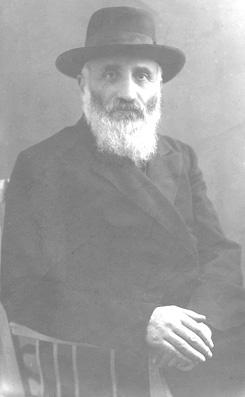Shimon Yaakov Gliksberg (1870 - 1950)
by Alex Gliksberg
 Rabbi Gliksberg
Rabbi Gliksberg
Biography
Born to a Hassidic family, Rabbi Gliksberg studied in a yeshiva in Miedzyrzec Podlaski and later in the Tomchei Torah institution of Minsk, founded by The Great One of Minsk.
In 1906 Rabbi Gliksberg became a rabbi in Odessa in one of the poorest districts of Moldavanka. He was renowned for his extensive knowledge of Judaism and Jewish literature, and for being a brilliant interpreter and preacher. His sermons at the city's main synagogue and at the Zionist synagogue Yavneh drew crowds of young men who listened attentively to his every word as he spoke in a deeply convincing and captivating manner that had much popular appeal.
In addition to his official duties as a rabbi he was active in the domains of education and social work. He was one of the founders of the Shomrei Torah yeshiva, and his efforts led to the establishment of public schools for impoverished Jewish children in affiliation with various synagogues in Odessa. He was also a founder of Ezras Holim, a charitable organization in Odessa. He published a pamphlet in Yiddish and Russian called Ezras Holim about concepts of charity and about support for ailing members of the community. The pamphlet was distributed in thousands of copies.
In 1917 he became a member of the Odessa City Council and was officially appointed as the city's chief rabbi. He continued to serve as Odessa's chief rabbi until 1937.
In the 1920s Rabbi Gliksberg came to prominence in the course of seven “religious debates” with Anatoly Lunacharsky, members of Yevsektsiya, Russian religious leaders such as Alexander Vvedensky and others. The debates took place in stadiums and theaters of Odessa with thousands of people present. During one of the debates Anatoli Lunacharsky, the Commissar of Culture and Education, said, "My faith in collective redemption gives me such power in the future as cannot be given by any religion." Rabbi Gliksberg replied, "The faith you have is precisely of the religious kind." During the debates Rabbi Gliksberg impressed the crowds with his erect posture, rhetorical talent, religious enthusiasm and apt remarks, as well as with his wide-ranging knowledge of philosophy, science and literature. Indeed, his power of conviction made him into what one of his opponents called a "dangerous debater."
In 1937 Rabbi Gliksberg moved to Eretz Israel where he was the head of the Rabbinical Court of Tel-Aviv. He was also a member of the Mizrahi's court of honoraries. For several years he served as one of the judges who awarded the Rabbi Kook Prize.
After Rabbi Gliksberg's death a street in Tel-Aviv was named after him and his son, artist Chaim Gliksberg.
In 1944 a part of Rabbi Gliksberg’s memoires written in Hebrew and titled Jewish Odessa was published in the weekly paper BaMishor.